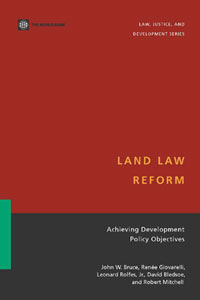Former World Bank senior counsel consults for developing countries and UN; his work has taken him to more than 50 nations
By Dan Edelen
 In the highlands of Ethiopia, John Bruce ’65 discovered his calling.
In the highlands of Ethiopia, John Bruce ’65 discovered his calling.
“It was a revelation,” he says of his days there as a Peace Corps volunteer lawyer, confronting issues facing the land-poor farmers as they struggled to survive. Recalling the vision imparted in his youth by the Methodist Church, Bruce’s concern for “the least of these” would define his life’s work: gaining access to land for the world’s poor and defending their property rights.
Bruce admits that in Columbia Law School, “real property seemed dull,” but he learned in Ethiopia that “it had remarkable political, social, and cultural ramifications in the developing world. I fell in love with the topic.”
After completing his doctorate in juridical science based on research into land tenure in Ethiopia’s mountainous Tigray region, Bruce taught property law at the University of Khartoum in Sudan. An opportunity to broaden his research brought him back to the States. In 1980, he joined the Land Tenure Center at the University of Wisconsin-Madison as the African Program coordinator, and later assumed the center’s directorship.
Convincing economists and sociologists that lawyers must play a key role in developing countries proved a worthy challenge. Bruce notes the Western world fails to comprehend the power of land ownership and the legal challenges faced by the poor.
“What makes people wealthy in America or Western Europe is not how much land they own, but stocks, bonds, and financial instruments,” he says. “In many developing countries, though, land is the primary source of wealth and a significant source of political power.”
Despite the differences in perceptions of the power of land ownership, American legal issues do have ramifications for land law elsewhere. Bruce notes that the Supreme Court’s Kelo v. New London eminent domain decision echoed worldwide.
“In the countries where I work, where people have a notion that private property in the West is more absolute than it actually is, it took lawyers by surprise,” he notes.
The inviolable nature of Western property rights was weakened, posing challenges not only for Americans, but for developing nations striving to improve legal rights for landowners.
In 1997, the World Bank called on Bruce’s expertise, naming him its senior counsel (land law) and the land tenure expert for its Rural Development Department. During his nine years there, Bruce took particular pride in his role in obtaining a reversal of a rule prohibiting Bank funds from being used to purchase land. As a result, the Bank now provides funds for groups of landless farmers to buy property.
Bruce’s work has taken him to more than 50 nations. In each, he’s confronted complex, seemingly intractable, legal and policy battles. In many African countries, Western forms of land ownership clash with customary land tenure, property ownership by tribal authorities or land passed down through generations. Working with Third World governments poses additional challenges because they represent vested interests. Officials in countries with a history of socialism have a planning mentality and balk at allowing individuals to manage their own land.
“I try to see each problem in its uniqueness, because each country is different,” Bruce says. “I help people figure out how to improve their situations, even modestly, setting obtainable goals that respond to felt needs rather than positing some ideal system.”
To further the goal of improving land law across the globe, Bruce edited and authored content for Land Law Reform: Achieving Development Policy Objectives, a 2006 World Bank publication. The book explores land rights issues in the management of forests and natural resources, securing women’s land ownership rights, creating new land laws to assist the poor, and developing titling and registration of land. This year saw the release of Land and Business Formalization for Legal Empowerment of the Poor, Strategic Overview Paper (ARD for USAID). He continues to publish regularly.
Though he retired from the World Bank last year, Bruce saw a pervasive need to continue the work he finds so rewarding.
“It made sense to set up a small firm to pursue some of these issues,” he says. “I’ve accumulated a wealth of knowledge, and there’s a lot to be done out there.”
Today, he operates Land and Development Solutions International, addressing land use and property rights for the world’s poorest people. Developing countries and international donor organizations like the United Nations and the Millennium Challenge Corporation continue to call on Bruce for his expertise. He recently returned from post-conflict Liberia, where the rule of law collapsed for many years.
“No one has copies of the laws or the court decisions, not even the courts,” he recalls.
In the midst of that devastating loss, Bruce helped a new National Land Commission resurrect and reform its land law and administration.
Bruce credits his international relations major at Lafayette as the impetus for his globe-spanning career. This year alone, he’s visited Ghana, Yemen, Liberia, China, Rwanda, and Taiwan.
As to the calling he heard decades ago, it’s never ceased ringing in his heart.
“When I have the chance to go somewhere new, to see new twists and turns on old themes I have worked with elsewhere, it still excites me,” he says.
 In the highlands of Ethiopia, John Bruce ’65 discovered his calling.
In the highlands of Ethiopia, John Bruce ’65 discovered his calling.